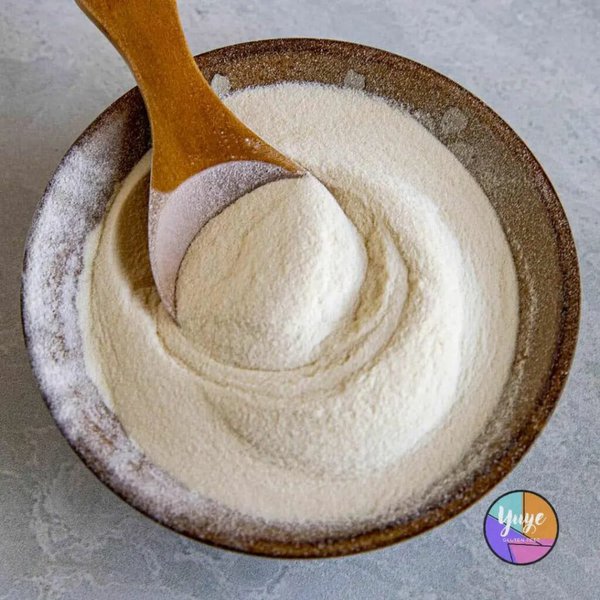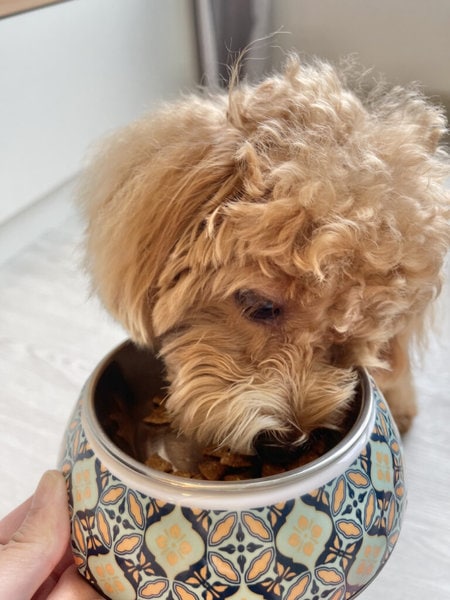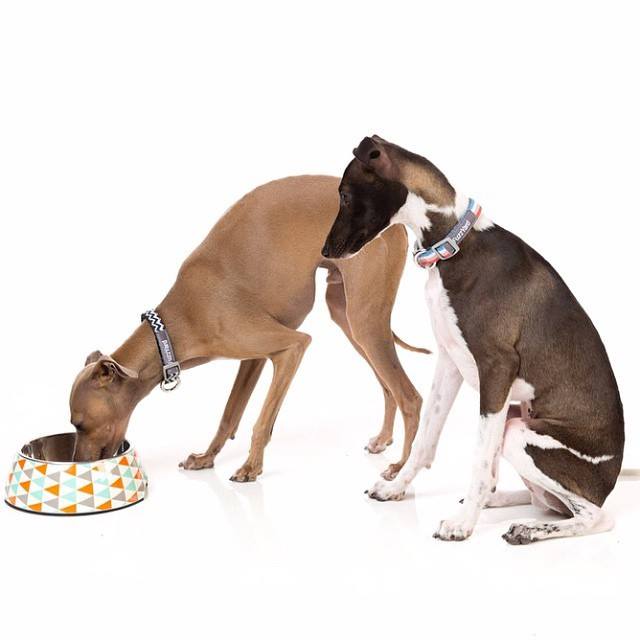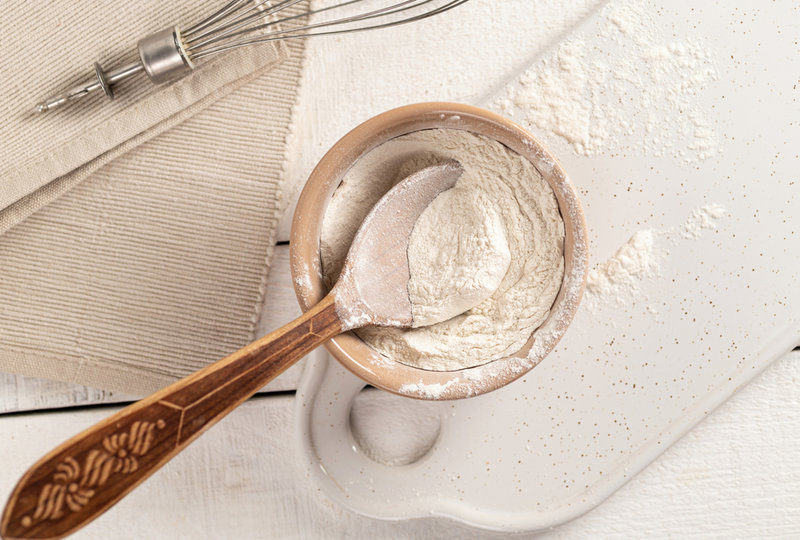Almost every canned dog food contains xanthan gum as part of its ingredients. But apart from not knowing what xanthan gum is, you may also be wondering whether it is safe for your pooch. Can dogs have xanthan gum? Here is the answer:
Yes, dogs can have xanthan gum, but in moderation. While there are no exhaustive studies on this additive yet, its prevalent use in canned dog foods and the non-reportage of mishaps on account of its consumption likely affirms its safety for dogs. So, if included in your dog’s food, you can safely serve it to your furry friend.
But there are side effects to feeding your pup with too much xanthan gum, and we will explore two of such in this article. We will also clarify the confusion between xylitol and xanthan gum. However, let’s start by considering whether foods containing xanthan gum are safe for pooches.
Can Dogs Have Foods Containing Xanthan Gum?

Yes, dogs can pretty much eat foods containing xanthan gum. Because it is an additive, dog food manufacturers add it in moderate quantities such that a dog can only be affected by ingesting an excessive quantity.
Regarding nutritional benefits, xanthan gum offers little to no advantage to pups. If taken in moderation, it also does not harm, too. Therefore, if you feel like excluding it from your pup’s food, you aren’t making the wrong decision.
But if xanthan gum offers no dietary benefit to pups, why do dog food makers include it in their recipes? Let’s find out the reason below.
Why Is Xanthan Gum Included In Dogs’ Food?
Xanthan gum is added to dog food as a thickener and stabilizer. Without it, some components of many commercial dog food will separate, and the desired compact form will not be achieved.
Compactness or stability is not so much a feature to attract dogs but their owners. Most canines decide whether a food item is good for them by taste and smell. However, for pet owners who are the buyers of these food items to keep coming, manufacturers had to devise ways to make them attractive.
Xanthan gum is made when the bacteria Xanthomonas campestris ferments glucose or sucrose such as corn or wheat.
The resulting compound goes through filtration and drying to yield a white sticky substance readily dissolvable in water and used by food manufacturers as a thickener.
Since this product is not naturally-occurring, it is essential to examine its safety for dogs. Is xanthan gum toxic to dogs? Let’s find out.
Is Xanthan Gum Toxic To Dogs?
Xanthan gum is not toxic to dogs if consumed in moderation and as a food additive. The chances are that your canine has taken it severally each time they ate canned dog foods, but its safety when consumed alone is uncertain.
As a clarification, there is nothing poisonous in xanthan gum either to dogs or humans. However, because some dog breeds cannot effectively digest polysaccharides, this additive goes straight into their digestive tract, where it is fermented and leads to vomiting or diarrhea.
Besides what we know about the safety of xanthan gum when used as food additives, there are no conclusive facts to submit that it might not be toxic when taken raw by dogs. As such, if you have raw xanthan gum at home, you should keep it far from your canine.
If taken in excess, xanthan gum can have some side effects in pups. That’s why moderation is always key with this additive. Check below two reasons your dog should eat this fermented sucrose in moderation.
Why Should Dogs Have Xanthan Gum In Moderation?

Dogs should have xanthan gum in moderation because they do not effectively digest it as humans. As a pentasaccharide consisting of repeated units of mannose, glucose, and glucuronic acid, some dogs will have a hard time digesting it.
Portions that are not properly digested find their way into your dog’s digestive tract or stomach, where they get fermented. This fermentation in the stomach or intestine induces vomiting or diarrhea in many dogs.
Besides the above setback, xanthan is an additive, which many vets advise that dogs should not take in excess. If your canine has too much xanthan in their system, that could indicate how heavily processed their food are.
Raw home-cooked dog foods are often more beneficial than heavily processed ones. While processed or canned foods might be handy and save time, they may contain other ingredients not suitable for your pup.
Is Xylitol The Same As Xanthan Gum?
No, xylitol and xanthan gum are not of the same substance. The former is a sweetener used in place of sugar, while the latter is an additive used to achieve food compactness and stability.
There have been controversies about the safety of xanthan gum for dogs because many confuse it for xylitol. Both look alike, given that they are white powdery substances, and someone jokingly remarked that they shared another similarity with each beginning with a similar alphabet, “X.”
Xylitol is an alcohol sugar found naturally in fruits such as berries, mushrooms, oats, and certain trees. Humans use it in place of sugar and to remove dental plaque.
However, xylitol is very toxic to dogs, and even minute quantities can result in severe conditions like hypoglycemia, liver failure, seizures, or outright death. So, it would be best if you did not feed your furry friend xylitol, no matter how small.
What If My Dog Ate Xanthan Gum In Food?
If your dog takes xanthan gum food, you don’t need to panic as it will be OK. The quantity of this additive in each food packing is not sufficient to cause any harm to your canine.
If your canine ate a glass full of pure unprocessed xanthan gum, the real concern comes. In that case, you will have to see your vet immediately to assess the situation. As already noted, the safety of xanthan gum outside of its inclusion in foods as an additive is unclear.
For the xanthan gum in a food pack or can to cause any gastrointestinal problem, your pup would have to take plenty of such food such that the problem would be from the excessive food intake and not the xanthan gum itself.
How Do I Prevent My Dog From Having Xanthan Gum?
There are two ways to prevent your dog from having xanthan gum, namely, keeping it out of their reach, and avoiding processed or canned foods.
Unless you produce dog food yourself or you are into catering, the chances are that you don’t even have pure xanthan gum at home. That’s because this substance does not occur naturally. So, your main focus would be to avoid canned or commercial dog food.
The reality, however, is that you might find yourself needing these canned foods at some point. So, total avoidance of xanthan gum may not be feasible. But as noted earlier, this additive, if taken in small quantities, is safe for your pup.






